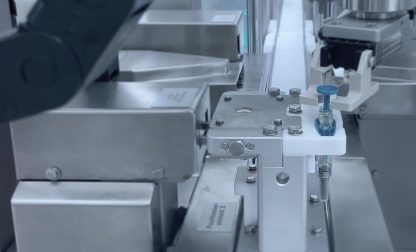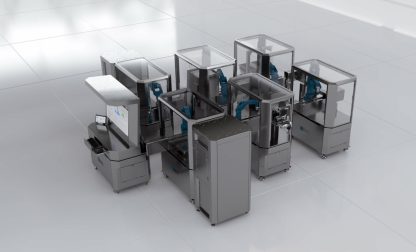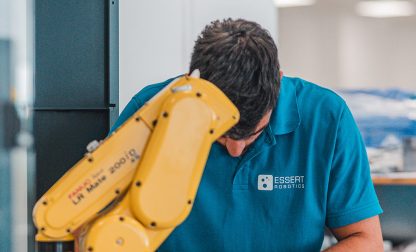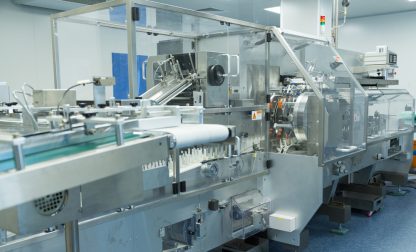Pharmaceutical automation companies: Top 10 suppliers you should know
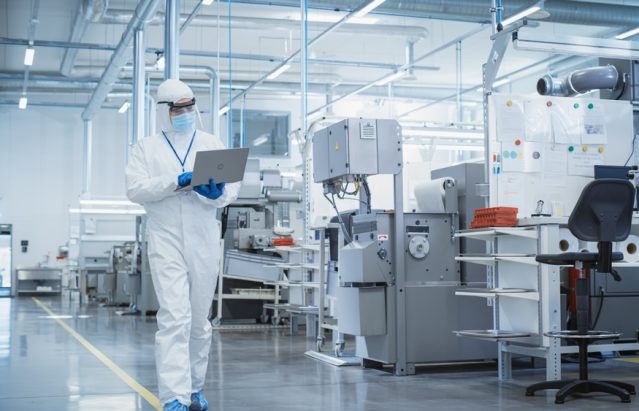
Just like artificial intelligence, automation is more than just a buzzword but rather plays an increasingly important role in many industries. It affects different aspects of our day-to-day life and is a driver in research and development as well as manufacturing processes.
Automation in the pharmaceutical industry it offers numerous benefits that impact various aspects of drug discovery, development, and manufacturing. Apart from increased efficiency, automation can also achieve enhanced levels of precision and accuracy and save costs.
It cannot only improve product quality but also compliance and traceability across the entire supply chain. And in addition to its ability to expedite liquid handling, it can also carry out labeling, handle all aspects of quality control, real-time validation and dosing.
In short, modern automation systems and automation applications can cover pretty much any aspect of drug development and manufacturing. There is a growing number of pharmaceutical automation companies on the market to cater to the demand of an increasingly complex industry.
In this article, we will take a closer look at what we consider to be the top ten providers for respective solutions required by pharmaceutical companies and the life sciences industry.
Robotic process automation in the pharmaceutical industry
By definition, process automation includes technologies like robotic process automation (RPA) or intelligent document processing (IDP), workflow orchestration, artificial intelligence (AI), and system integrations.
Process automation in the pharma industry, more precisely, refers to systems and applications that help push both development and production by streamlining the various processes involved.
With robotic process automation greater efficiency is achieved by robots that can perform repetitive tasks such as assembling, filling or packing at higher speed and accuracy than humans. This reduces the risk of human error – along with associated costs – in all aspects of drug development and pharmaceutical production.
Top 10 companies in pharmaceutical automation
While we are aware that the market is constantly growing and changing, we want to take a closer look at the current landscape. Below we are taking a look at ten manufacturers that we believe are currently leading the game in their respective specialized fields.
Please be aware that this is a comprehensive compilation of suppliers spanning various automation domains within the pharmaceutical industry. It encompasses not only our primary focus at ESSERT Robotics, such as medical device assembly or laboratory automation solutions, but also extends to other areas such as logistics and packaging.
10 well known pharmaceutical automation companies:
ESSERT Robotics – High Mix Low Volume automation solutions
ESSERT Robotics specializes in providing automation solutions tailored for High Mix / Low Volume applications. Next to general industries, there is a high focus on crafting solutions specifically designed for the pharmaceutical industry.
These solutions revolve around streamlining and automating various laboratory and pharmaceutical production processes. Additionally, the German company offers a flexible and modular production line for manufacturing medical devices, all while adhering to the concept of a flexible production. This approach allows for considerable flexibility and variability in production output.
Harro Hoefliger – more than just mechanical engineering
Harro Hoefliger specializes in the development of production and packaging equipment. They don’t focus directly on High Mix / Low Volume solutions, but they quite flexible automation solutions for mid-volume quantities. In regard to pharmaceutical automation, the company’s solutions include machines for capsule, tablet powder and inhalation products, technologies covering wallet and blister systems as well as assembly carton packaging.
The former sole trader company has grown to a global player. Today, Hoefliger, with a workforce of around 800 employees and history reaching back more than 40 years, is a trusted supplier of technology made in Germany.
Syntegon – pharmaceutical packaging solutions
Syntegon is among the leading suppliers of process and packaging technologies, specializing in high-volume packaging solutions. The company, formerly of the Bosch Group, has been supplying the pharma and food industries for more than 50 years.
It currently employs close to 6,000 people in more than 15 countries around the globe. Their digitized control systems facilitate the monitoring of machine conditions and process steps as well as the detection of malfunctioning equipment.
FANUC – automation solutions for manufacturing
FANUC is a Japanese automation and robotics company and as such mainly supplies pharmaceutical manufacturing companies with industrial automation solutions. FANUC also offers clean room robots that can safely process, dispense, label, and package medications and prescriptions at high volume.
With their customized pharmacy automation systems and robotic pharmacy solutions, FANUC aim to support pharmaceutical manufacturers in meeting production and productivity goals. Today, the company, which was founded in 1952, has more than 40 million products and 1 million robots installed worldwide.
Bausch+Ströbel – pharmaceutical packaging
Bausch+Ströbel is a supplier of systems that are used to clean, sterilize, fill, and label pharmaceutical items such as medicine bottles, ampoules, syringes, cartridges, and injection vials. Coming from humble beginnings, the company has grown to a global provider of high-volume technologies.
Together with Harro Hoefliger and others, it is a member of alliance Excellence United, a partnership of manufacturers of specialized machinery for the pharmaceutical, medical technology, and process industries.
ATS Life Sciences – automated manufacturing solutions
Founded by a German immigrant, ATS Life Sciences is a Canadian company specializing in the development, design and construction of automation systems both for high- and low mix volume. Among its customers are manufacturing companies from the pharmaceutical industry as well as providers of medical devices.
The company employs around 4,200 people in North America, Europe and Asia. One of its core fields is scalable solutions for medical devices, diagnostics, pharmaceutical packaging and lab operations.
Thermo Fisher Scientific
Thermo Fisher Scientific is an American supplier of analytical instruments and specialty diagnostics as well as laboratory, pharmaceutical and biotechnology services and life science solutions. The company is the result of a merger between Thermo Electron and Fisher Scientific in 2006. Over the years, it has acquired other providers of reagents, consumables, instrumentations, and services.
Its automation systems are paired with a portfolio of digital solutions to facilitate the connection of everything from lab automation to data management. The final aim is to provide customers with complete process control and oversight of their labs and processes.
Zipline International – drone delivery in pharma
As the name may suggest, Zipline International specializes in logistics solutions, enabling healthcare providers to expedite both their supply chain and patients’ access to care. This is made possible by employing drones for various tasks such as home delivery or lab sample transport.
The company is a relatively young one and originally started out by delivering blood and medical products in Rwanda in 2016. Today, Zipline offers two distinct platforms for long-range and for precise home delivery. With more than 57 million kilometers covered and almost 800,000 deliveries made since its inception, the company now sends drones to its customers around the globe.
Charles River Laboratories – automation for scientific advances
Charles River Laboratories is an American company specializing in a variety of preclinical and clinical laboratory services. Its innovative solutions are a welcome support in the development of FDA approved novel treatments.
Today, the company, which was founded in 1947, operates more than 90 facilities in 20 countries, with employee numbers reaching 18,500 globally. Apart from solutions for pharmaceutical manufacturing, Charles River also provides scientific and regulatory advisory services that help navigate the changing regulatory landscape.
Insilico Medicine – AI for pharmaceutical research
Insilico was founded in 2014 as an alternative to animal testing for research and development programs in the pharma industry. The company, with headquarters in Hong Kong and New York City, focuses on AI as well as deep-learning technologies.
It utilizes those in the development of novel therapies and medications, both in collaboration with others and on its own. Insilico is aiming to employ “artificial intelligence for every step of pharmaceutical research and development”, thus revolutionizing the industry.
Summary – automation solutions in pharmaceutical industry
If inspected more closely, it becomes obvious that “pharmaceutical automation” is an umbrella term describing a number of modern technologies that all aim at automating certain repetitive tasks in the pharmaceutical industry. Whether it is AI, robotics or software, every single company introduced in this article specializes in a certain field with the aim of supporting the life sciences and pharmaceutical industries.
From device assembly to data management, from clinical trials to large-volume, ISO- and FDA-compliant production lines, automation technology supports companies wanting to streamline their processes. Depending on your respective needs, you will find that there are various providers offering a number of solutions – the choice is yours.
Read more about automation in the pharmaceutical industry:
Pharmaceutical automation: Innovations shaping an industry
Process automation simply explained
3 trends driving automation in life science industry
What is lab automation?
High-Mix Low-Volume: Possibilities & Limitations
